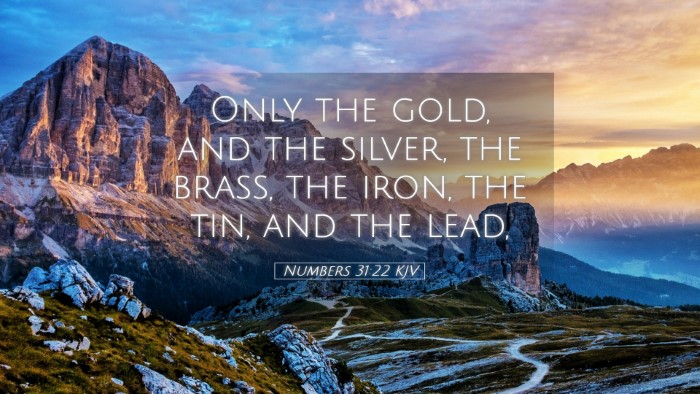Commentary on Numbers 31:22
Numbers 31:22 reads: "Only the gold, and the silver, the brass, the iron, the tin, and the lead." This verse is part of a larger narrative about the Israelites' victory over the Midianites and outlines the distinctions regarding what was to be considered as plunder.
Contextual Overview
The context of this passage is critical in understanding its implications. The Israelites had engaged in battle against the Midianites as ordered by God. After their victory, God commanded Moses to take a census of the spoils and assign them accordingly. The verses preceding and following this one clarify what items were to be consecrated and used in the worship of the Lord.
Insights from Commentaries
Matthew Henry's Commentary
Matthew Henry emphasizes that this division of spoils is not merely secular but holds significance in that it sets apart what has been gained through divine assistance. He notes:
- Divine Providence: Henry suggests that the bounty reflects God's providence, implying that every good gift comes from above (James 1:17).
- Consecration: The materials listed (gold, silver, brass, and others) signify that even war spoils are to be treated with reverence, symbolizing that all things, even what might seem profane, are part of God's creation and can be utilized for holy purposes.
- Accountability: He also remarks on the importance of accountability in the distribution of the spoils, aligning actions with God's decrees.
Albert Barnes' Notes
Albert Barnes expands on the types of materials mentioned in the verse:
- Cultural Significance: Each material (gold, silver, brass, iron, tin, and lead) holds distinct value in ancient cultures. Gold and silver were seen as the most prestigious, while others were crucial for daily living and industry.
- Symbolism of Purity: Barnes expresses the idea that the choice of materials signifies purity and value. The listing symbolizes the idea that all forms of wealth can be rendered holy if they are used in service to God.
- Protection from Idolatry: The materials must not be seen as trophies of conquest that could lead to idolatry but should be offered for God’s service, reflecting a humble acknowledgment of God’s ultimate sovereignty.
Adam Clarke's Commentary
Adam Clarke provides theological reflections on this verse, emphasizing the broader implications for life and worship:
- Divine Authority: Clarke explains that the directive concerning the spoils illustrates the principle of divine authority governing even the outcomes of war. Every acquisition is under God's dominion, demonstrating His control over nations and conflicts.
- Lessons on Ownership: He contrasts the Israelites' attitude towards spoils with modern perceptions of ownership, suggesting believers should have a mindset that recognizes God's ownership over all resources.
- Spiritual Warfare: Clarke links this narrative to the concept of spiritual warfare, indicating that the principles of consecration and the allocation of resources extend to the battle against sin and spiritual enemies.
Theological Implications
This verse prompts contemplation of broader theological themes:
- Divine Sovereignty: The meticulous detailing of what can be kept illustrates God's control over every aspect of the believer's life, reminding us that even the results of our efforts belong to Him.
- Holiness and Usefulness: The items taken from the battle represent the call to consecrate all aspects of life to God. This reinforces the understanding that material wealth can serve God’s purposes.
- War Ethics in the Biblical Context: Scholars can explore the ethical dimensions of warfare within the biblical narrative, highlighting how faith informs conduct during conflict and after victory.
Practical Applications
For pastors, theologians, and students, Numbers 31:22 serves as a rich source of insight applicable to contemporary issues:
- Stewardship: Encouraging the congregation to view their resources as gifts from God and to utilize them for His service, mirroring the commitment of the Israelites to consecrate their spoils.
- Worship and Materialism: Addressing the challenge of materialism in modern society by teaching about the importance of aligning our possessions with spiritual values.
- Community Accountability: Setting up structures within church governance that reflect biblical accountability and transparency in dealings concerning resources.
Conclusion
In closing, Numbers 31:22 serves as a profound reminder of the relationship between faith, material possessions, and divine purpose. By examining such texts through the lens of traditional commentaries, deeper understanding emerges, allowing spiritual leaders and scholars to engage with and apply these timeless truths in their ministry.


